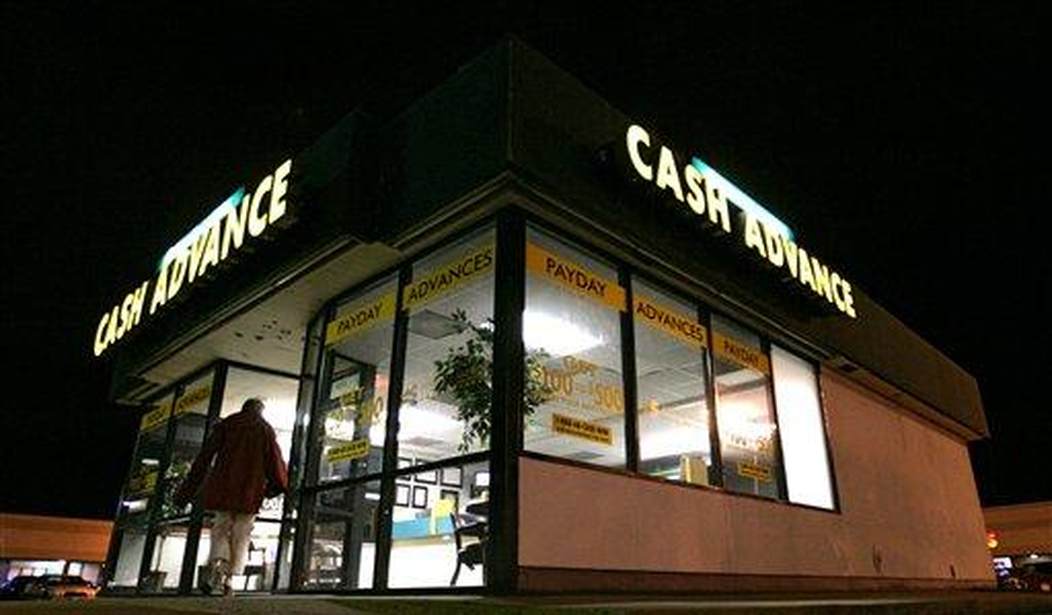This week could’ve been a terrible one for millions of low-income American consumers. If Consumer Financial Protection Bureau (CFPB) rules set up in 2017 had been allowed to proceed, lenders that provide short-term cash to help struggling Americans cover unexpected expenses would had to have cleaned out their offices by August 19 and shut their doors forever. Fortunately, the Trump administration reversed course and made sure that 19 million vulnerable Americans weren’t stripped of the vital financial services they desperately rely on. By trying to eliminate these much-needed financial services, the CFPB demonstrated just how out-of-touch elite bureaucrats are with the lives of working-class Americans.
When the CFPB was created in 2011, the bureaucracy quickly set its eyes on short-term lenders. Following a series of smaller actions against these businesses, the bureaucracy promulgated a rule in 2017 that would have effectively knocked payday financial services out of existence. Despite experts deeming this action as “one of the most detrimental regulatory actions ever taken by the Bureau,” the rulemaking process went undeterred.
Officials couldn’t be bothered to consider how regulations would exacerbate the daily struggles facing millions of struggling families. Almost 80 percent of Americans live paycheck to paycheck while 40 percent of Americans aren’t able to cover a $400 unexpected expense without borrowing money or selling something they own. Additionally, 91 million Americans have subprime credit scores or insufficient credit history to get a loan. And, due in large part to onerous Dodd-Frank provisions, 8.5 million Americans don’t have a bank account. These dire circumstances have persisted due to crippling regulations that have locked millions of Americans out of the financial system.
In order to be able to pay unexpected expenses without being forced to sell off vital household items, Americans rely on the small-dollar credit market to pay unexpected bills. In return for a flat fee, usually around $35, they receive a loan to be repaid when they receive their next paycheck.
Recommended
Supporters of restrictions on payday loans argue that, for a small loan of $200, $35 in interest over two weeks represents an unacceptably high rate of “interest” (usually calculated over the course of a year). But these loans are for short time-periods, rendering annual projections of interest meaningless. More crucially, however, short-term loans are very different than what is found in the traditional banking market. If someone doesn’t have a high credit score, let alone a bank account, providers of loans take a large financial risk in lending to them. Defaults account for more than 20 percentof operating expenses at payday-loan stores, compared to just 3 percent for commercial banks. Higher-than-normal “interest rates,” then, are needed to keep these businesses afloat.
Even with these rates, payday lenders have an anaemic pre-tax profit margin of under 10 percent, compared to the consumer financial-services industry as a whole which averages a pre-tax profit of more than 30 percent.As such, applying the same rules to the small short-term credit market as for large financial institutions belies a complete misunderstanding how of these markets operate.
None of these facts mattered to Obama-era CFPB bureaucrats, who ended up twisting data in their zeal for prohibition. When first announcing the rule, the CFPB relied almost exclusively on the research of Professor Ronald Mann from Columbia University. But Professor Mann repudiated the CFPB's summary of his work as "so inaccurate and misleading" that it was "unrecognizable." Given the CFPB’s gross negligence in dealing with data, it was a relief to millions of Americans that, in February 2019, the Trump Administration suspended the implementation of these rules and is considering ruling them out entirely.
This rollback is critical to the well-being of the tens of millions of Americans who regularly rely on these services. Absent regulatory reform, many consumers will be forced to go outside the system and use loan sharks that charge far higher interest rates. Some will be forced to visit pawn brokers or sell off valued family possessions. Some will even be forced to forgo groceries or the essentials of life.
Like many policies promulgated by out-of-touch politicians and bureaucrats, payday lending restrictions hurt the very people they are intended to help. The 80 percent of Americans who live paycheck to paycheck need access to emergency loans when something goes wrong. Squeezing out short-term lenders will only hurt struggling families.
An effective ban on short-term lending may make for a good soundbite, and a good fundraising ployfor ultra-liberal advocacy groups, but it does not make for good policy. The only danger Americans need protecting from is out-of-control paper pushers in Washington.
Tim Andrews is the Executive Director of the Taxpayers Protection Alliance.
























Join the conversation as a VIP Member